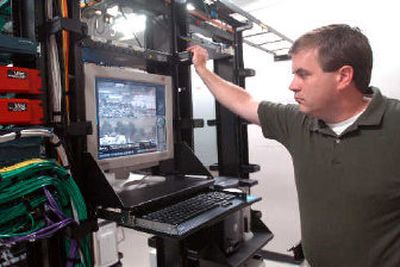Cameras a force

It’s kind of like the “seeing eye” from “The Lord of the Rings”: a grapefruit-sized camera atop a tower outside the Post Falls Police station, capable of zooming in more than a quarter-mile.
Lt. Scot Haug can control the 360-degree camera from his office, in one instant watching shoppers in the Wal-Mart parking lot to the east and the next zooming in on a flag in front of Super 1 Foods to the west.
The images aren’t detailed enough for Haug to take down a license plate number in the parking lot or count the stars on the flag waving in the breeze. But if something big happened within the camera’s range, the footage might be useful.
If the bank across Interstate 90 were to be robbed, for instance, the camera could capture the make and model of a suspect car, Haug said.
The camera is one of about 40 that record 24 hours a day in the River City, and the images can be pulled up for real-time viewing on computers at the police station. About half of the cameras are in and around the police station.
Officers can also tap into any of the cameras with the wireless laptops in their patrol cars.
“Some would call it surveillance,” Haug said. “We call it trying to keep up.”
The cameras allow police to be in two places at once in a city that’s growing faster than its police force, Haug said. By fall, the department plans to install infrared cameras on Interstate 90 to capture images of license plates on every passing vehicle – about a million cars a month. The numbers will be instantaneously checked against a nationwide database of stolen cars, suspected criminals and possible terrorists.
Funded with a $145,000 grant from the state’s Bureau of Homeland Security, the joint project with Coeur d’Alene Police and the Kootenai County Sheriff’s Department will also fund cameras on the freeway near the junction with Highway 95 in Coeur d’Alene.
It’s the first project of its kind in the state.
Post Falls Police also are looking to tap into cameras on the traffic light standards at intersections in Post Falls. Up until now, the cameras have been used only to detect whether cars are waiting at a red light to trigger a signal change.
Connecting to cameras on the standards would help in the case of accidents at the intersections, Haug said. Police could assess the situation before they get to the scene and, if drivers are pointing fingers at one another, there would be hard proof of what happened.
There are already cameras in most Post Falls parks, including the skate park, that constantly monitor the action. Traffic going in and out of the parks is taped so if a crime is reported, officers can use license plate numbers to track down potential suspects or witnesses.
Haug said the cameras have helped police catch kids ruining freshly poured cement and track down a stolen golf cart that belonged to the Post Falls Community Volunteers.
Video evidence almost always results in a confession, he said. “It’s pretty tough to go into court and say, ‘I didn’t do it,’ when you’re on video,” he said.
Haug believes the cameras also serve as a crime deterrent. Police installed a camera system at the Post Falls Library about a year ago after repeated complaints of vandalism and rowdy, disrespectful kids.
The cameras have helped authorities catch vandals and thieves, librarian Joe Reiss said. But Reiss added he’s a skeptic when it comes to cameras in his library and hometown.
The library doesn’t post signs informing people they are on camera, but it probably should because it could “bother some people,” he said.
Reiss said those who have been caught on tape doing something wrong haven’t been all that surprised that they were being watched.
“I think our society has gotten to the point where we don’t think that’s extraordinary at all, that we should anticipated we’re being watched,” he said. “It’s unfortunate, but it’s the truth.”
Kootenai County Sheriff Rocky Watson said he believes the public would have been outraged in the past “if they thought Big Brother was watching.”
“I think the attitude has changed,” Watson said. “It’s making people safer.”
Though the camera perched on the tower behind the Post Falls police station could zoom into somebody’s window at home, Haug said department policy prohibits that sort of privacy intrusion. Random checks are done to make sure employees are not watching something they shouldn’t, he said.
The recorder that stores footage from all of the department’s cameras is kept in a locked room with limited access, he added.
Haug envisions a time in the distant future when there will be cameras everywhere – something that’s already happening in other countries.
In Britain, he said, there are cameras on just about every city block, allowing the authorities to “follow” one car from camera to camera for miles.
“I don’t know if America’s ready for that,” Haug said. “I think eventually when we get over that ‘someone’s watching’ issue, we could make great strides.”